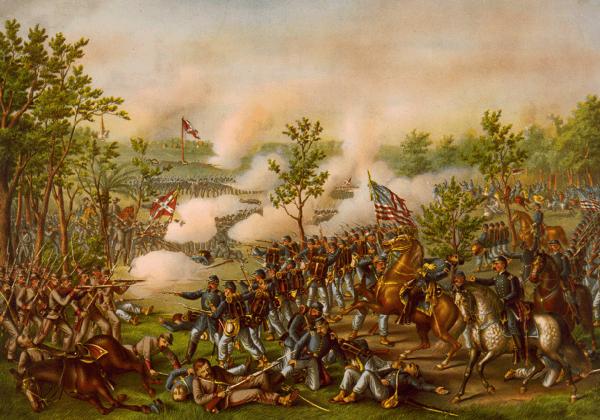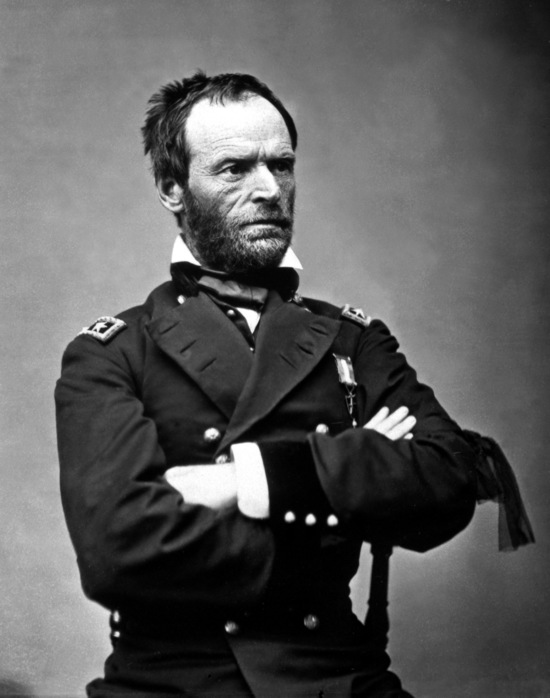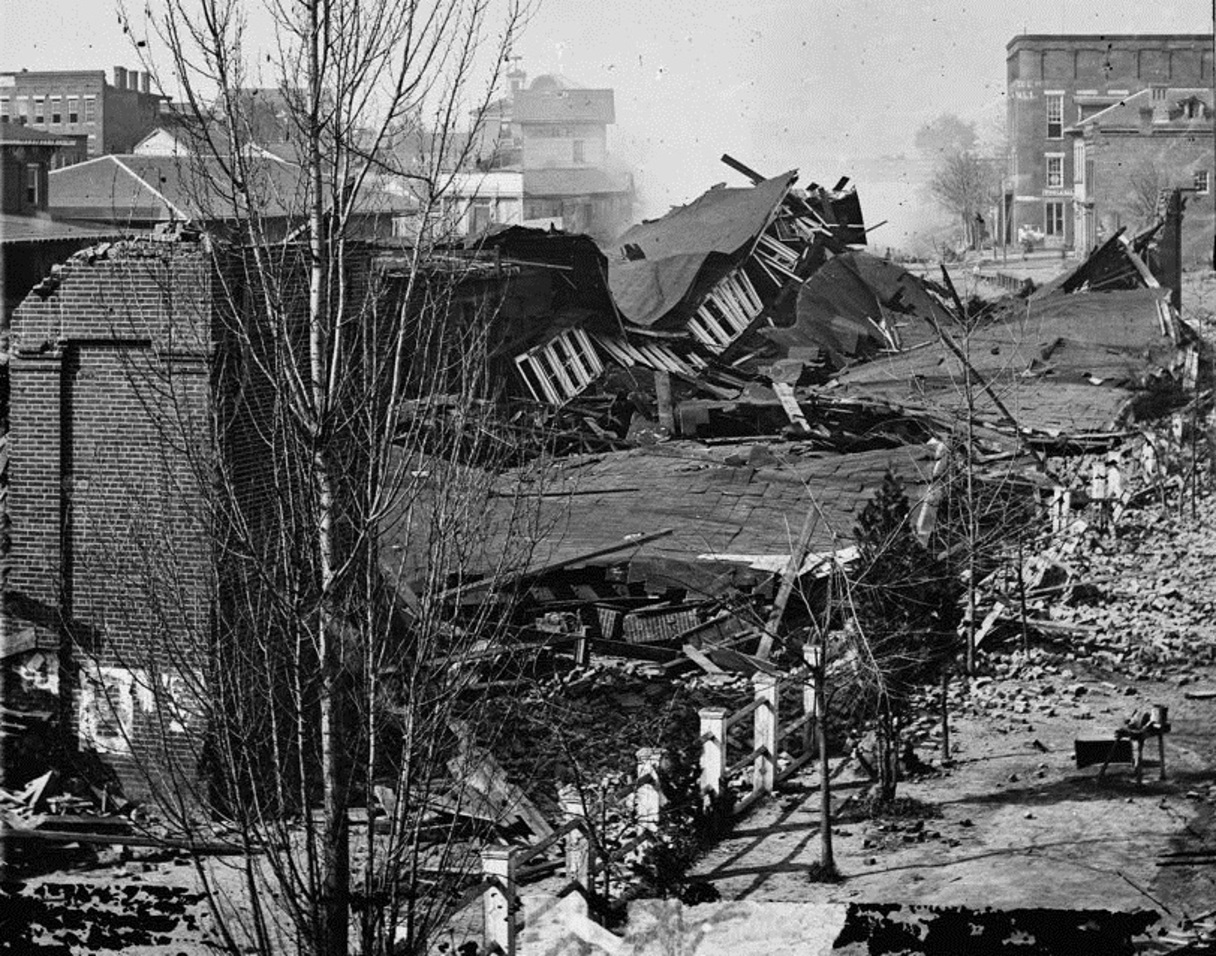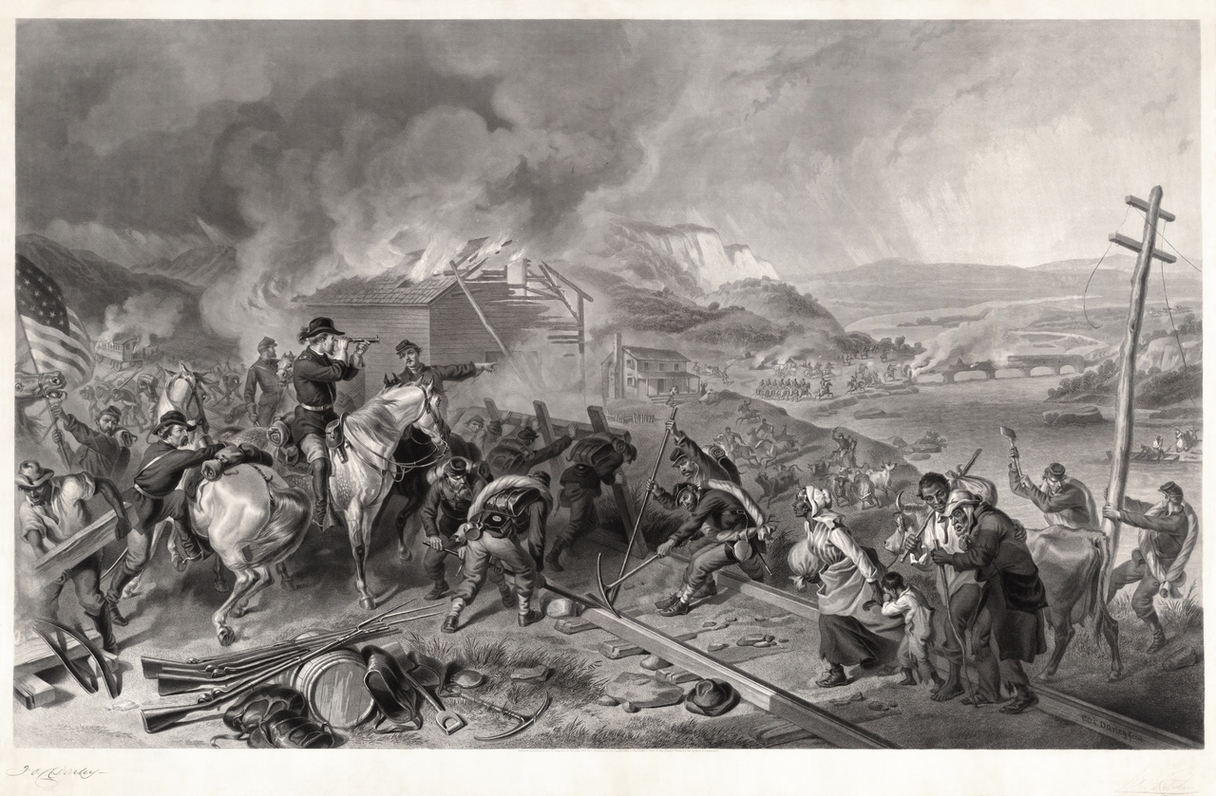|
|
Living
in Atlanta with the Legacy of Sherman
By
Steve Davis, May 30, 2022 (originally published June 5, 2020)

Battle
of Atlanta - by Kurz and Allison 1888
|
|
|
Big fires in American history spawn legends. Mrs. O'Leary's cow may not have
started the Great Chicago Fire, but William T. Sherman is said to have burned down all of Atlanta.
The old legend has it that Sherman allowed his soldiers to burn the entire city.
In front of the State Capitol today is a plaque declaring that before they left, the Federals "reduced the
city to ashes." (It was placed there by the United Daughters of the Confederacy in 1920.)
Union forces occupied Atlanta from September 2 to November 16, 1864; most of the
residents were kicked out by Sherman's order. During that time, he got approval to lead 60,000 troops across Georgia
to the sea. Before they left, the Northern commander ordered his engineers to tear down, blow up, or burn all shops,
warehouses, railroad roundhouses, and freight depots, plus pry up all track in the city. Sherman wanted nothing
left for the Rebels to use when they returned.
|
|
|

William T. Sherman | National Archives
|
|
The demolition began after the last northbound train left Atlanta on the morning
of November 12. The big passenger depot was knocked down by big battering rams; a railroad freight depot was blown
up with 700 pounds of powder. On the 13th, engineers started setting fires to designated facilities. "Of course
the fires have spread considerably among the residences," observed a Connecticut captain. This arson may have
been accidental, but other fires were intentional. Whole blocks of the business district were marked for burning;
these went up in smoke on the afternoon of November 15. That was when much of downtown was aflame. Seeing that
"the pioneers were having all the fun," Sherman's men set their own blazes, especially in the residential
suburbs.
Atlantans today can't agree on how much of our city was burned by Sherman's men,
but a good estimate is around 40 percent. We got over it, as everyone knows, when citizens began returning to rebuild.
"At present, all is life, and energy, and enterprise," Atlanta's Daily Intelligencer boasted in early
April 1865; "Onward seems to be the motto of our people."
When Sherman visited Atlanta in January 1879, the Atlanta Constitution beamed that the general would
find "a proud city, throbbing with vigor and growth." During his three-day stay, Sherman warmed to the
hospitality shown him by dignitaries and citizens. Atlantans could even joke about the fires of fifteen years before.
"Ring the fire-bells!" someone cried when Sherman's train rolled in; "the town will be gone in 40
minutes!"
|
|
| |

Ruins of Atlanta's Union Deport after burning by Sherman, 1864 | unc.edu
|
|
|
|
|
The mood was different a few years later, when Sherman again visited Atlanta.
While he was touring the International Cotton Exposition, the Constitution reprinted a wartime account of the Yankees' extensive destruction of the city. It also
reprinted a passage from Jefferson Davis' memoir that criticized Sherman's expulsion of the city's residents. The
newspaper went further, quoting Davis' outrage over Sherman's March: "the arson of the dwelling houses of
noncombatants and the robbery of their property, extending even to the trinkets worn by women, made the devastation
as relentless as savage instincts could suggest."
Sherman got the hint, and left the city the next day.
So Atlantans have had a love-hate thing for Cump. "Oh, that was the best thing
that ever happened to us," exclaimed one Atlantan several decades after the war. "Why, we've built a
good deal better town, and if Sherman had not destroyed it as he did it's likely the old dingy buildings would
have been standing yet.â It was in this vein that in 1976 Atlanta
Magazine put forth an article titled, "Thanks, Cump for his encouraging
start to the city's urban renewal.
Which brings up the political button I bought in the summer of 1988 when the Democratic National Convention was
held in downtown Atlanta.
|
|
But there's an obverse. In 2001 the Constitution printed a generally
favorable article on Sherman by the historian Lee Kennett that sparked a lot of reader response. Boy, did it. "May
you soon join your hero, Sherman, for eternity," snapped one reader; "burn with him, you hypocrites."
"Lee Kennett's effort to sell Sherman as a nice guy is about as effective as selling a skunk as a perfume
factory. After 157 years Sherman still smells!" The same reader added, "he was a terrorist, plain and
simple." One Constitution reader offered that "if on Earth in 2001, Sherman would be on trial
in The Hague and would make a great war criminal.
Down here in Georgia, the discussion continues.
|
|
| |

Sherman's march to the sea | LOC
|
|
|
|
|
|
|
|
|